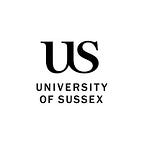“You have to think how you can help people on the way up. They’re the ones that matter.”
University of Sussex alumna Ann Grant remembers her student days in the 1960s, and how being non-privileged gave her the edge in the coolness stakes.
I came to Sussex in 1967 after a year of being a Voluntary Services Overseas cadet in Uganda. I’d had an amazing experience being a teacher and a house mother in a convent. Uganda had gained independence just four years earlier and it felt like an exciting time in African history. I decided that I wanted to go to university to do African studies. There weren’t many places I could do that, and Sussex seemed to me the most interesting.
Because of my experience, I thought I would be way ahead of everyone else when I arrived at Sussex. I’d got my hair done and bought a new coat, only to see these rather androgynous kids. They all seemed to know each other because they’d been to the same public schools — or some of the more progressive schools where they hadn’t worn uniform. It was the first time I’d ever seen people kissing on both cheeks in greeting.
Being state-educated from London gave me some prestige. I could have worried about how to think and speak like these people, but I didn’t. They said they didn’t want to be like their privileged parents. At the time everything innovative, modern and interesting came from the working classes — especially in fashion and music. It really helped if you were a cockney or a Liverpudlian. A student who became my best friend was from Preston and he felt the pressure of being northern on top of everything else. But he was fine.
Although London was swinging by 1967, it hadn’t started happening in Brighton. There weren’t many of us and we didn’t really integrate or make an impact on the town. We mostly lived in B&Bs and really kept to ourselves. But we did put on gigs on campus. I helped to set up the Soul Society and we had DJs playing Motown and black American music. I also remember Jimi Hendrix being booked to play, but I don’t remember seeing him.
I did Politics and International Relations in the School of African and Asian Studies. That was the coolest school, no question. This was the era of civil rights, African independence, anti-imperialism, and decolonisation. I did my dissertation on Japanese imperialism. It was the foundation of my understanding of the world. From our studies we knew that imperialism doesn’t switch off the day you get independence.
If you stopped somebody on the campus and asked them to describe their politics, they’d probably say they were a Maoist or a Trotskyite. It’s what people expected to hear. I remember the anti-Vietnam War protest in 1968, when the American ambassador Robert Beers had a can of red paint thrown over him. That made front page news in the New York Times, and after that we were interviewed on the telly about why we were ‘out of control’. Some of our politics were a bit shallow, though. Everyone was anti-apartheid, but how many people knew much about it or did anything was questionable.
I applied to work at the Foreign Office for a dare in 1971. I was told I wouldn’t get in because I wasn’t Oxbridge or public school — and I was a woman. But I did get in. I was the only woman, and the only non-Oxbridge educated student out of 20 recruits. It felt like they had put all their eggs into one basket.
Because of the confidence I’d gained at Sussex, I thought they were lucky to have me. Being a woman was the least of my worries. The Civil Service has had equal pay since the 1930s and, because I was in the fast stream, I was privileged from the beginning. I moved around the globe as a British diplomat, with postings in India, New York and Brussels, and ended up in South Africa — where I wanted to be — after the end of apartheid in 1994. It was an amazing experience, especially Mozambique.
In 2005 I joined Standard Chartered Bank as Vice Chair because I had been involved in the HIV programme in Africa and they were just developing their programme. It was the only place I had any ethics training and where you were marked on living your values. You could say you believed in equality, but then you would be asked what three things you had done to prove that was true. It’s still to be discussed, but my starting point was that you don’t end poverty by government-to-government transfer of resources. You have to have civil society, the private sector and government working together.
I think I have been so amazingly lucky, but I don’t know if I have really made a difference to people’s lives. I’m reflecting on that now — and what I could be doing next. I’m still busy. Until recently I was on the board of the London School of Tropical Medicine. And I’m the chair of a jazz company that’s putting on the London Jazz Festival in November. My passions are jazz and football — I’ve followed Arsenal since the age of nine.
I always look after younger people. I have mentored many young women, and now I have ambassadors all over the world. My old bosses have now all retired or are dead. You have to think how you can help the people on the way up. They are the ones that matter. Not those at the top.
Interview by Jacqui Bealing
www.sussex.ac.uk
